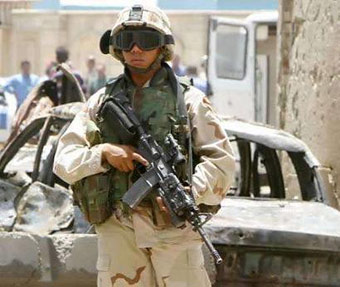|
US Army saw prison violations last fall
(Agencies)
Updated: 2004-06-02 09:02
An Army general who visited Abu Ghraib prison in Iraq last fall complained that the military was violating international war standards by incarcerating common criminals along with insurgents captured in attacks against U.S.-led forces.

A U.S. Army soldier secures the area outside offices of the Patriotic Union of Kurdistan (PUK) after a bomb exploded in central Baghdad, June 1, 2004. [Reuters] |
It was one among dozens of observations in a still-classified report, obtained Tuesday by The Associated Press, portraying an overcrowded, dysfunctional prison system lacking basic sanitation and medical supplies.
"Due to operational limitations, facility limitations and force protection issues, there are criminal detainees collocated with other types of detainees, including security detainees," wrote Maj. Gen. Donald Ryder, the Army's provost marshal general. "However, the Geneva Convention does not allow this."
Ryder warned that mixing such prisoners "invites confusion about handling, processing and treatment."
Article 84 of the Fourth Geneva Convention prohibits housing prisoners of war and "persons deprived of liberty for any other reason" with general criminal populations. The rules also require that enemy prisoners be kept in facilities "affording every guarantee of hygiene and healthfulness."
Ryder's 64-page report, dated Nov. 5, states at the outset that investigators found no evidence of "inappropriate" treatment of Iraqi detainees by military police. It does not detail any efforts to find evidence of the abuse that occurred at Abu Ghraib around the time he visited the prison — except to note that his team found a "wide variance" of detention practices at Coalition Provisional Authority facilities, including "flawed or insufficiently detailed use of force and other standing operating procedures or policies."
Widely circulated photos have shown U.S. soldiers abusing prisoners.

In this undated image obtained by NBC News, and made available Wednesday May 26, 2004, what appear to be Iraq detainees lay on the floor, while U.S. military personnel are seen nearby at the Abu Ghraib prison on the outskirts of Baghdad. [AP] |
An Army spokesman declined to comment on the report. Ryder's mission in Iraq was to assess the capabilities of the country's prison system — not at a specific prison. The report was assigned by Lt. Gen. Ricardo Sanchez, the chief of U.S. forces in Iraq.
Other senior Army officials, including Maj. Gen. Antonio Taguba, who was appointed in January to investigate allegations of abuses and whose report found them widespread, also have complained separately about the mingling of prison populations in Iraq.
But none so explicitly acknowledged that the Army's procedures might have violated international law.
"You can no longer say there was some unclarity or wiggle room about what we were doing there," said Deborah Pearlstein, director of the U.S. law and security program for Human Rights First, a private rights organization. "Here you have your own general saying, 'We're in violation of international law.'"
The report described a chaotic prison system, with staff lacking "basic necessities" such as food, cleaning supplies and hygiene items, and carrying little accountability for providing adequate health care.
At some facilities, contractors were allowed to use "unsecured" and "unsupervised" tools, while soldiers carried weapons when interacting with detainees — "an unacceptable risk inside a confinement facility," according to the report. The report does not specify what the tools were.
At Camp Ganci, the holding facility for security internees at Abu Ghraib, the "area is littered with trash, has pools of water standing around latrines and the bottles of water carried by detainees for water consumption are filthy," the report said. Moreover, it charged, Abu Ghraib "lacks hospital beds, diagnostic equipment" and is understaffed and unprepared to care for chronically sick and mentally ill detainees.
At one point, the report prescribes brooms and bleach to be distributed throughout the prison system. It also recommends building a laundry facility where detainees could work.
Although President Bush and some members of Congress have called for destroying Abu Ghraib, Ryder strongly recommended keeping it in operation.
It "should be the centerpiece for both the military mission and the eventual transfer of facilities to Iraqi control" until a new, $100 million prison is built elsewhere, perhaps at Kanbani Saad, according to the report.
Abu Ghraib "should continue in operation to help meet anticipated future bed space requirements," the report noted.
|